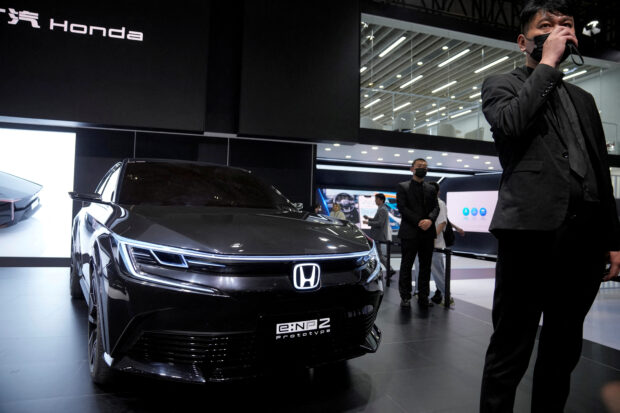Weak yen gives Japan’s automakers temporary relief from China pain

Honda’s electric vehicle (EV) e:NP2 is displayed at the Auto Shanghai show, in Shanghai, China April 18, 2023. REUTERS/Aly Song/File photo
TOKYO – Japanese automakers are getting much-needed cover from an old standby, as the weaker yen helps prop up profits amid declining sales in China and the increasingly tough shift to electric vehicles.
Toyota, Honda and Nissan recently reported earnings that topped analyst estimates by 6 percent to 21 percent in the three months through June, and all cited the currency as a factor.
“If the yen stays low, they clearly benefit but it doesn’t offset any other concerns,” said Satoru Aoyama, senior director at Fitch Ratings Japan.
“They are struggling in the Chinese market,” he said. “They just don’t have an immediate solution” for their problems there, he added.
Nissan late last month upgraded its full-year operating profit forecast, raising it by 30 billion yen ($208 million) to 550 billion yen. About 20 billion yen of that came from the currency, CFO Stephen Ma told a briefing.
A weak yen has traditionally lifted profits for Japan’s big exporters, although it is no longer as large a boon for automakers that have increased their overseas manufacturing in recent years.
Automakers‘ shares are quick to react to swings in the yen, although the companies themselves tend to stick to conservative forecasts for the currency.
For instance, Toyota has stuck to its forecast for an average exchange rate of 125 to the dollar this business year, a level not seen since April 2022, about a month after the U.S. Federal Reserve started raising interest rates. The yen was at 144 on Thursday.
At smaller Subaru, a move of one yen against the dollar has a 20 billion yen impact on operating profit, CFO Katsuyuki Mizuma said earlier this month.
On Wednesday, a Honda official said its April-June operating profit came in tens of billions of yen higher than expected, with the weak yen accounting for about half of that.
“The yen wasn’t only weak against the dollar, but also against other currencies, including in Asia and Europe, so that comes through as a profit,” the official said.
China struggle
The yen‘s cushion couldn’t come at a better time for Japanese automakers, which are struggling in China. The world’s largest auto market is increasingly being dominated by home-grown players.
Nissan’s China sales to retail customers slumped 46 percent during the quarter and those of Honda were down 5 percent.
Sales of Toyota, including of its Lexus luxury brand, rose over the period. For the first half of the calendar year, they declined almost 3 percent.
Japanese automakers have also been slow to pivot to the growing global market for electric vehicles with competitive offerings.
It is unclear how long the weak yen will last. Japan’s central bank recently tweaked its cap on bond yields, sparking expectations it could eventually exit the ultra-loose policy that has weighed on the currency.
Influential former finance ministry official Eisuke Sakakibara told Reuters the yen could strengthen to 130 by the end of the year.
Subaru has kept its forecast at 128 yen, CFO Mizuma said, citing the difficulty in predicting the currency.
“We’re really closely watching exchange rates,” he said.
($1 = 144.2400 yen)